In the year 2024, the eCommerce landscape stands at the forefront of a transformative epoch, heralding an era defined by unparalleled innovation and dynamic shifts in consumer behavior. With statistics indicating a steady surge in online retail activities, the convergence of cutting-edge technology, a steadfast focus on consumer needs, and an unwavering commitment to sustainability is reshaping the very essence of digital commerce.
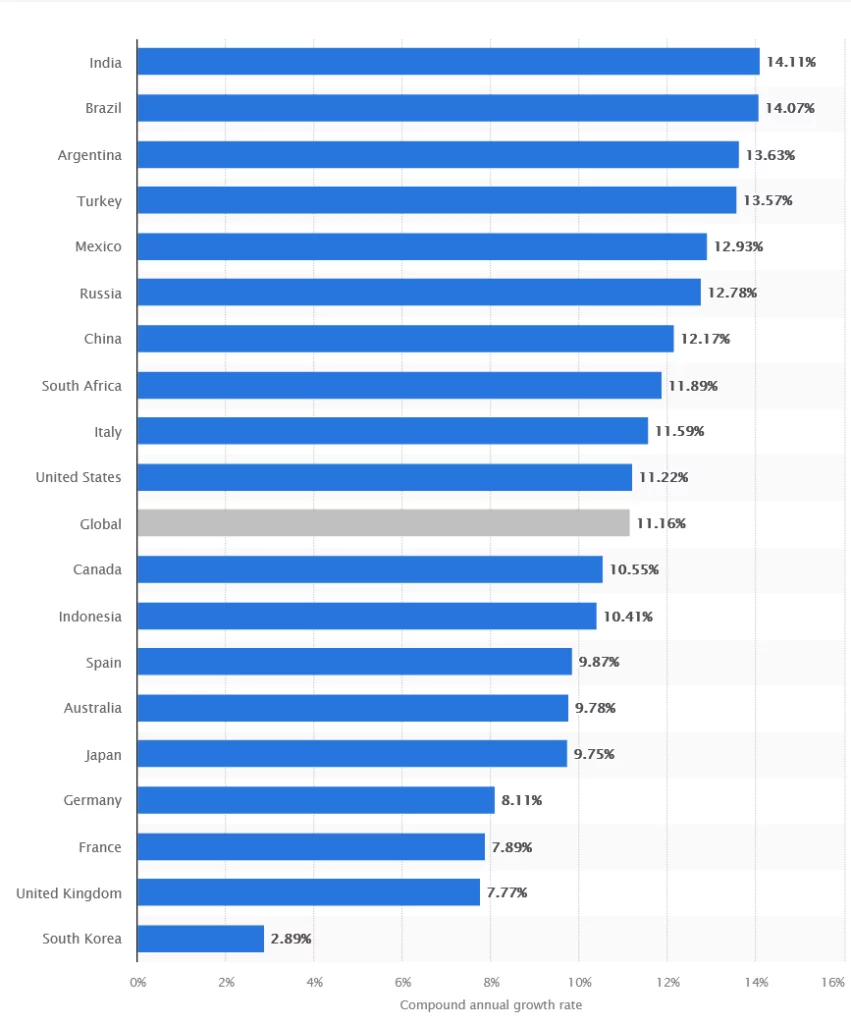
Source: Retail e-commerce sales compound annual growth rate (CAGR) from 2023 to 2027, by country
A. Ecommerce Entrepreneurship
1. Niche-Specific Online Stores:
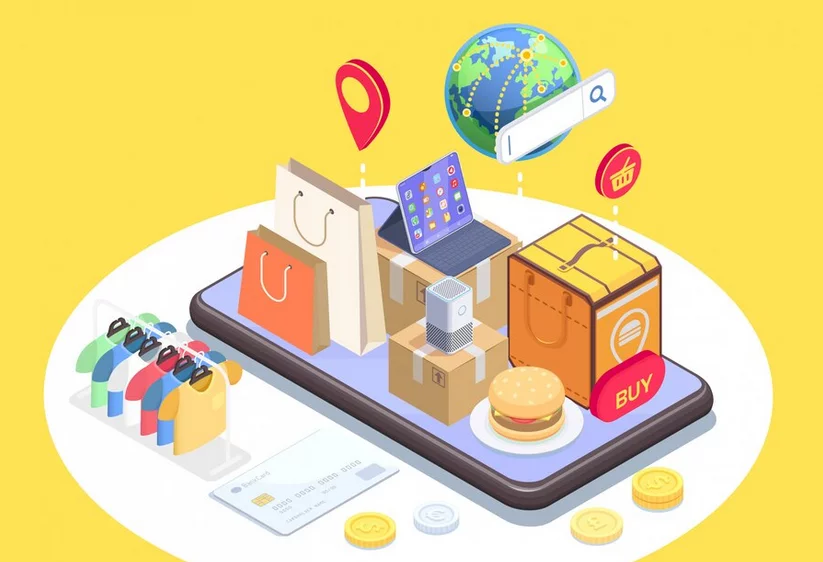
Niche-specific online stores cater to a specialized segment of the market. They focus on particular products or services tailored to a specific audience with unique needs or interests. These stores offer a curated selection of items, providing in-depth product knowledge and fostering a sense of community around shared interests.
Pura Vida Bracelets specializes in handmade bracelets, catering to individuals interested in beach lifestyles, surfing, and outdoor activities. The brand has built a community around this niche, supporting artisans and offering unique, beach-inspired jewelry.
2. Dropshipping Businesses:
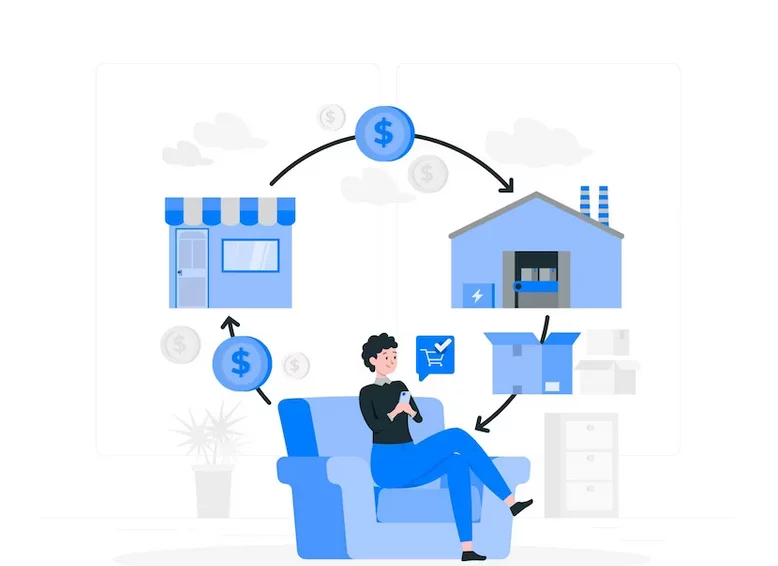
Dropshipping involves selling products through an online store without stocking inventory. When a product is sold, the store purchases it from a third party and ships it directly to the customer. This model streamlines inventory management and reduces overhead costs.
Oberlo facilitates dropshipping by connecting merchants with suppliers, predominantly on the Shopify platform. Merchants can import products to their stores from suppliers and fulfill orders directly from the supplier’s warehouse, eliminating the need for inventory management.
3. Print-on-Demand Merchandise Shops:

Print-on-demand stores enable customers to customize and create unique products. These shops print custom designs on various items like t-shirts, mugs, and phone cases after an order is placed. This model allows the sale of personalized merchandise without holding bulk inventory.
Redbubble is a renowned print-on-demand platform where artists upload designs, and customers can order products featuring those designs. Redbubble handles production and shipping, allowing artists to earn a commission on sales.
4. Subscription Box Services:

Subscription box services send curated product packages to customers on a recurring basis. These boxes contain items related to a specific theme, interest, or need. Subscribers anticipate and discover new products regularly, creating an element of surprise and engagement.
Birchbox focuses on beauty and grooming products, delivering a monthly box with sample-sized beauty and skincare items. Subscribers explore new products and brands tailored to their preferences through this subscription service.
B. Content Creation
5. Blogging and Vlogging:

Blogging involves creating written content, often articles or posts, typically published on a website. It allows individuals or businesses to share information, opinions, stories, or expertise on various topics. Conversely, vlogging shares similar content but in video format, often on platforms like YouTube. Both mediums enable creators to engage with audiences, share knowledge, and build communities. Example: A travel blogger may write about their experiences visiting different countries, sharing travel tips and stories on their blog. In contrast, a vlogger might create videos showcasing their adventures, providing visual content to their audience.
6. Podcasting:

Podcasting entails creating audio content, usually in an episodic series, that audiences can stream or download. Covering a wide range of topics, podcasts include educational content, storytelling, interviews, news, entertainment, and more. They offer flexibility, allowing listeners to consume content while multitasking.
“The Joe Rogan Experience” hosted by Joe Rogan is a popular podcast featuring interviews with guests from diverse fields, offering in-depth conversations and discussions.
7. YouTube Channel Creation:
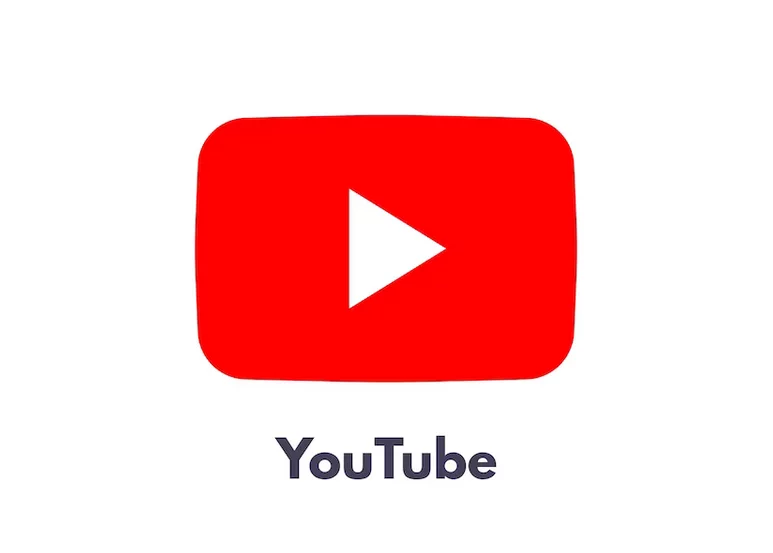
YouTube channel creation involves producing video content shared on the YouTube platform. Creators can focus on niches like entertainment, education, tutorials, reviews, gaming, lifestyle, and more. YouTube channels provide opportunities for monetization through ad revenue, sponsorships, and merchandise sales.
“Linus Tech Tips” is a technology-focused YouTube channel producing reviews, tutorials, and tech news for an audience interested in the latest tech advancements.
8. Ebook Publishing:

Ebook publishing involves creating and distributing electronic books in digital formats like PDF, EPUB, or MOBI. Authors can self-publish or work with publishers to release their books digitally. Ebooks offer convenience, accessibility, and cost-effectiveness compared to traditional print books. Example: “The 4-Hour Workweek” by Tim Ferriss began as an ebook and became a bestseller. Ferriss shared insights on lifestyle design and entrepreneurship, reaching a wide audience through digital distribution.
C. Freelance Work and Consultations:
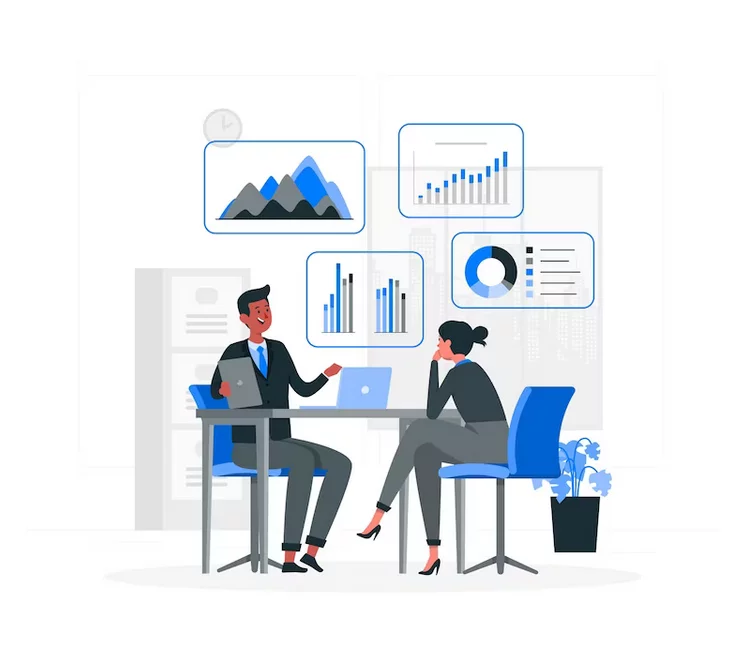
9. Freelance Writing, Graphic Design, or Web Development:
- Upwork: This platform connects freelancers globally with clients seeking services in various domains, including writing, design, development, and more.
- Toptal: Renowned for providing high-quality freelance talent in software development, finance, design, and other specialized areas.
- 99designs: Specializes in graphic design services, allowing clients to host design contests or collaborate directly with designers for their projects.
10. Business Consulting:
- McKinsey & Company: A prominent global management consulting firm offering services in strategy, operations, and more across industries.
- Bain & Company: Known for its expertise in business strategy, performance improvement, and advisory services for various organizations.
- Deloitte: Offers diverse consulting services spanning finance, technology, human resources, and more to assist businesses.
11. Social Media Management:
- Hootsuite: Provides a comprehensive platform for managing multiple social media accounts, scheduling posts, and analyzing engagement metrics.
- Sprout Social: Offers solutions for social media management, analytics, and engagement to optimize social media marketing efforts.
- Buffer: Helps users plan, publish, and analyze social media content across different platforms with streamlined tools.
12. Online Tutoring and Coaching:
- Khan Academy: Offers free educational resources covering various subjects, providing personalized learning materials.
- Chegg Tutors: Connects students with tutors for online tutoring in various subjects and academic levels.
- MasterClass: Provides online courses taught by renowned personalities in different fields, offering mentorship and guidance to learners.
D. Affiliate Marketing:
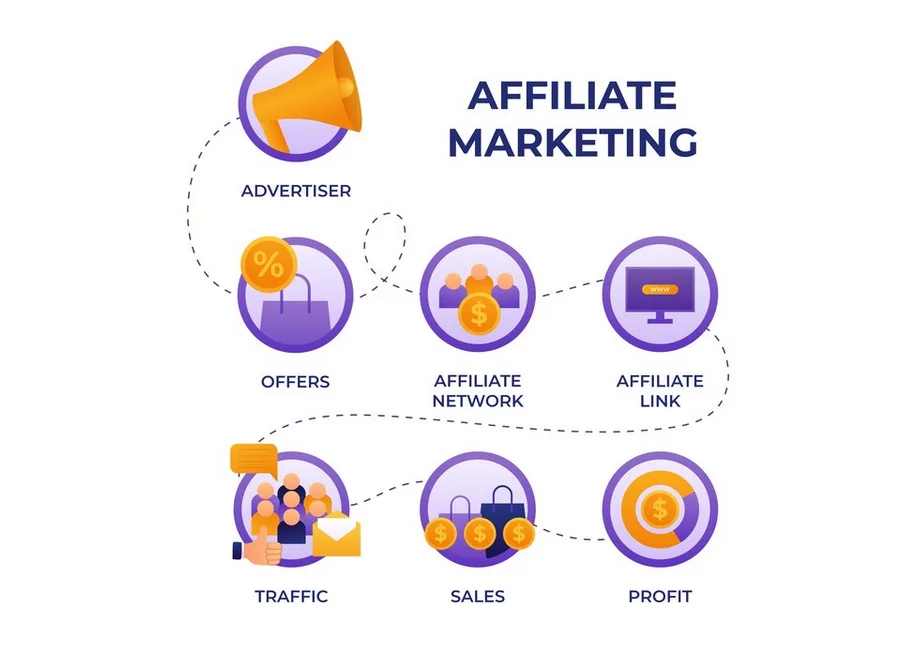
13. Niche Affiliate Websites:
Niche affiliate websites are specialized platforms catering to specific interests or industries. They offer valuable content, reviews, comparisons, and recommendations within a particular niche. These websites earn commissions by promoting products or services through affiliate links.
Some notable affiliate marketing platforms include Amazon Associates, ShareASale, and Commission Junction (CJ), which provide a wide range of affiliate programs across various niches.
14. Social Media Influencer Partnerships:
Social media influencers collaborate with brands to promote products or services to their followers. With substantial followings, these influencers engage audiences by creating captivating content, reviews, or endorsements. Revenue is earned through affiliate partnerships via unique links or discount codes.
Social media platforms like Instagram, YouTube, and TikTok serve as key channels for influencer marketing and affiliate partnerships.
15. Affiliate Partnerships with E-commerce Brands:
E-commerce brands often operate affiliate programs allowing individuals or websites to earn commissions by driving traffic and sales. Affiliates promote the brand’s products through various channels like websites, social media, email marketing, or content creation.
E-commerce platforms such as Shopify, BigCommerce, and Magento often offer affiliate programs that affiliates can join to earn commissions.
E. Remote Wellness and Health Service

16. Online Fitness Coaching:
Online fitness coaching involves remotely providing personalized workout plans, guidance, and support using digital platforms or applications. Coaches leverage technology to interact with clients, offer tailored exercise routines, track progress, and provide motivation.
Process:
- Assessment: Understanding client goals, fitness levels, health history, and preferences through consultations.
- Personalized Programs: Crafting tailored workout routines, diet plans, and lifestyle recommendations based on individual needs.
- Remote Communication: Regular interaction via video calls, messaging apps, emails, or dedicated fitness platforms for check-ins, guidance, and support.
- Progress Tracking: Using fitness apps or software to monitor client progress, track workouts, assess improvements, and adjust plans accordingly.
- Motivation and Accountability: Providing encouragement and accountability to ensure adherence to the program.
Fitbit Coach provides personalized training plans, workouts, and guidance through the Fitbit app, offering tailored fitness routines and tracking tools.
17. Nutritional Counseling:

Nutritional counseling offers personalized advice, education, and guidance on dietary choices to improve health and achieve specific nutrition-related goals.
Process:
- Assessment: Understanding client’s dietary habits, health concerns, goals, and lifestyle factors through consultations or assessments.
- Customized Nutrition Plans: Developing tailored meal plans, dietary recommendations, and strategies based on individual needs and goals.
- Education and Support: Providing information about food choices, portion control, meal preparation, and grocery shopping.
- Follow-Up: Regular check-ins, reviews of dietary habits, adjustments to the nutrition plan, and ongoing support to ensure compliance and progress.
MyFitnessPal offers nutritional tracking, personalized meal plans, and food insights, aiding users in achieving dietary goals.
18. Mental Health Coaching:

Mental health coaching focuses on improving emotional well-being, coping mechanisms, and mental health through coaching techniques and guidance.
Process:
- Assessment and Goal Setting: Identifying client concerns, stressors, emotions, and goals to create a tailored plan.
- Skills Development: Teaching coping skills, stress management, mindfulness practices, and strategies for mental resilience.
- Guidance and Support: Offering empathetic listening, regular sessions, and support to navigate challenges and emotions.
- Monitoring Progress: Tracking emotional well-being, discussing improvements, evaluating setbacks, and adapting strategies accordingly.
- Referrals: When necessary, referring clients to mental health professionals or specialists for specialized support.
Talkspace provides online therapy sessions and counseling with licensed therapists, offering support for mental health and emotional well-being.
F. Software and App Development:
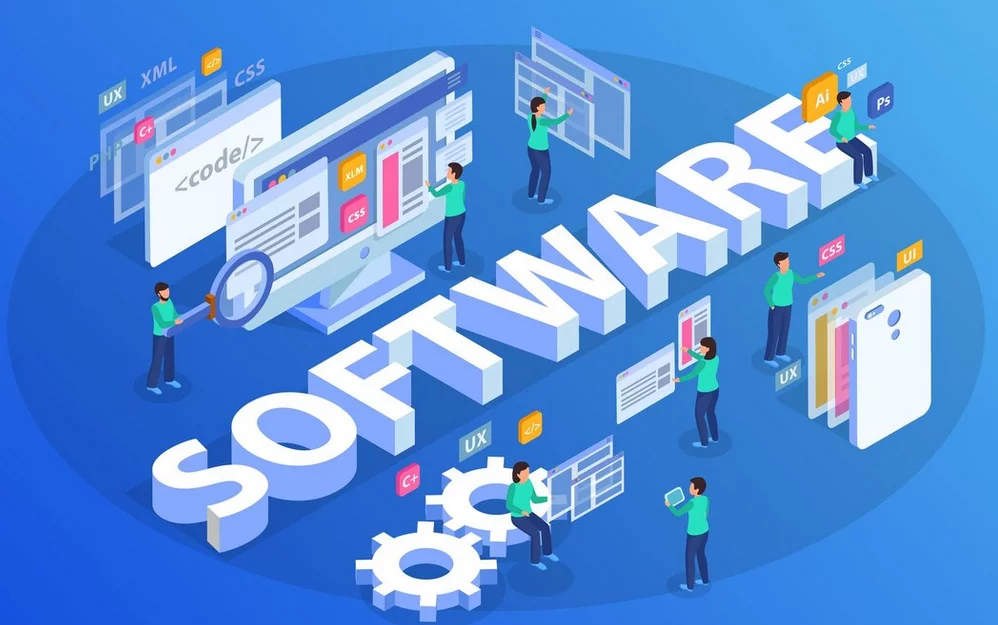
19. Mobile App Development
Mobile app development involves the creation and deployment of applications tailored for mobile devices, including smartphones and tablets. This process typically encompasses several stages, starting from conceptualization and design to coding, testing, and launching the application on various app stores like Google Play Store or Apple App Store.
Tools & Technologies:
- Programming Languages: Java, Kotlin, Swift, React Native, Flutter, etc.
- Development Platforms: Android Studio, Xcode, Visual Studio, etc.
- Testing Tools: Appium, TestFlight, Firebase Test Lab, etc.
20. SaaS (Software as a Service) Creation
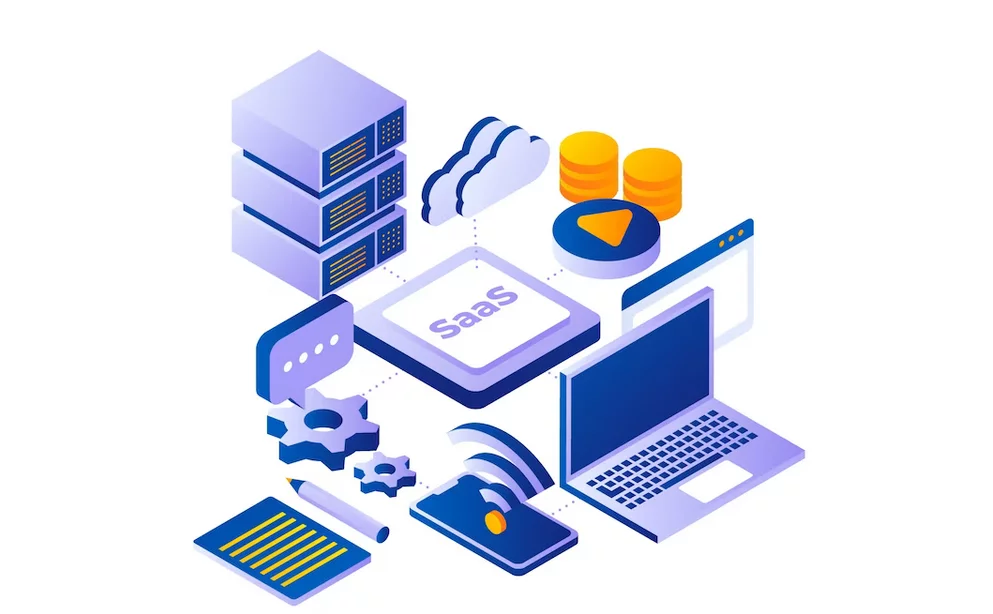
SaaS involves providing software applications via the internet on a subscription basis, eliminating the need for users to install and maintain the software on their local devices. SaaS applications are accessible through web browsers and offer various functionalities tailored to the users’ needs.
- Development Platforms: AWS, Azure, Google Cloud Platform, etc.
- Frameworks: Angular, React, Vue.js, etc.
- Payment Gateways: Stripe, PayPal, etc.
21. Game Development
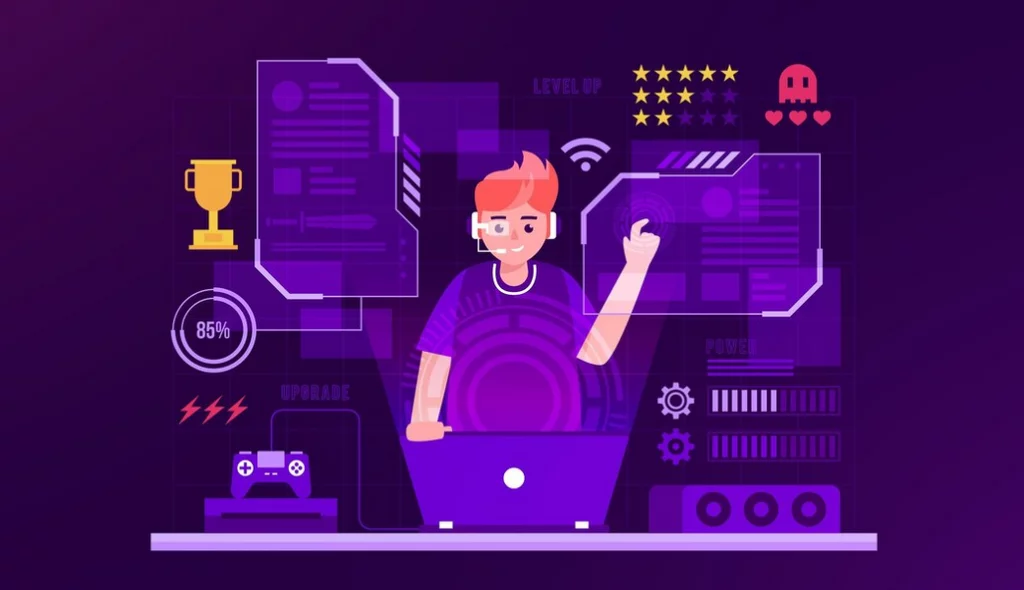
Game development involves creating interactive experiences, from concept to final deployment, catering to various gaming platforms, including consoles, PCs, mobile devices, and web browsers.
- Game Engines: Unity, Unreal Engine, Godot, etc.
- Programming Languages: C++, C#, JavaScript, etc.
- Graphic Design: Adobe Photoshop, Blender, Autodesk Maya, etc.
G. Dropshipping

22. Dropshipping Business Model
Dropshipping involves partnering with suppliers who handle inventory storage, packaging, and shipping. As a store owner, you list products on your website, and when a customer places an order, the supplier ships the product directly to the customer. You profit from the price difference between the supplier’s rate and the price you set.
Oberlo & Shopify: Oberlo, integrated with Shopify, enables entrepreneurs to import products directly from suppliers into their Shopify stores. For instance, selling fashion accessories sourced from suppliers on platforms like AliExpress.
Factors that Affect the Success of Ecommerce:
- Customer-Centric Approach:
User Experience (UX): User-centric design and interface play a crucial role. Easy navigation, intuitive layout, mobile responsiveness, and fast-loading pages enhance the overall experience. Smooth checkout processes and minimal friction points encourage conversions.
Personalization: Tailoring experiences based on browsing history, purchase behavior, and demographics fosters customer loyalty. Customized product recommendations and personalized marketing communication engage users effectively.
- Product Selection and Quality:
Unique Offerings: Identifying a niche market or offering innovative products sets a business apart. Exclusive or unique items attract attention and drive customer interest, allowing businesses to establish themselves as market leaders.
Quality Assurance: Consistency in delivering high-quality products builds trust and credibility. Customer satisfaction and positive reviews enhance brand reputation, resulting in repeat purchases and positive word-of-mouth marketing.
- Effective Marketing Strategies:
Omni-channel Presence: Utilizing various platforms like social media, marketplaces, and websites expands market reach. A cohesive marketing strategy across channels ensures consistent brand messaging and increases visibility.
Content Marketing: Engaging and informative content, such as blogs, videos, and social media posts, not only educates but also builds brand authority. It attracts and retains customers by providing valuable information related to products or services.
- Robust Technology Integration:
Mobile Optimization: As mobile shopping continues to surge, ensuring mobile-friendly websites and apps is critical. Responsive design and user-friendly interfaces for mobile devices improve the overall shopping experience.
Tech Innovations: Leveraging emerging technologies like Artificial Intelligence (AI), Augmented Reality (AR), and Virtual Reality (VR) enhances customer experiences. AI-driven personalization, AR product try-ons, and VR-based immersive experiences captivate and engage users.
- Logistics and Fulfillment:
Efficient Shipping: Timely and cost-effective shipping options influence customer satisfaction. Offering various shipping methods, including express or same-day delivery, and transparent tracking systems enhance the customer experience.
Inventory Management: Maintaining optimal stock levels prevents stockouts and disappointments. Effective inventory management ensures that popular items are always available, minimizing lost sales opportunities.
- Customer Service and Support:
Responsive Support: Quick and helpful customer service, be it through chatbots, live support, or email, significantly impacts customer retention. Efficiently addressing queries, concerns, and issues creates positive customer experiences.
Feedback Utilization: Actively collecting, analyzing, and implementing customer feedback improves products and services. It demonstrates attentiveness to customers’ needs and fosters a sense of being valued.
- Trust and Security:
Secure Transactions: Providing secure payment gateways and SSL certificates ensures data security. Transparently displaying security measures boosts customer confidence in making online transactions.
Transparent Policies: Clearly communicating return, refund, and privacy policies establishes trust. Being upfront about policies creates a transparent and reliable shopping environment.
- Adaptability and Innovation:
Market Trends: Staying updated with market trends and consumer behavior enables quick adaptation to changing preferences. Anticipating and responding to market shifts keeps businesses relevant.
Continuous Improvement: Encouraging a culture of innovation and adaptability within the company fosters growth. Constantly improving processes, products, and services keeps businesses ahead of the curve.
- Analytics and Insights:
Data Utilization: Leveraging analytics tools to understand customer behavior, preferences, and shopping patterns drives informed decision-making. Insights derived from data help optimize marketing strategies and improve customer experiences.
Metrics Tracking: Monitoring key performance indicators (KPIs) like conversion rates, average order value, customer lifetime value, and customer retention rates helps in evaluating performance and identifying areas for improvement.
Conclusion:
In the realm of eCommerce, the landscape for 2024 is an exhilarating canvas brimming with innovation, opportunity, and endless possibilities. As the digital marketplace continues to evolve, several prominent trends shape the future of online businesses.Amidst this dynamic landscape, the key to thriving lies in innovation, adaptability, and a deep understanding of evolving consumer needs. Aspiring eCommerce entrepreneurs are presented with an unparalleled opportunity to carve their niche, foster brand loyalty, and drive meaningful change through inventive, customer-focused solutions.
FAQs on Ecommerce Business Ideas:
How can I start an eCommerce business without inventory?
Consider dropshipping or print-on-demand services where you partner with suppliers to fulfill orders, eliminating the need for inventory.
How do I market my eCommerce store effectively?
Utilize social media advertising, influencer partnerships, content marketing, and SEO strategies to reach and engage your target audience.
What technology trends should I consider for my eCommerce business?
Explore AI for personalization, AR/VR for enhanced shopping experiences, and blockchain for secure transactions and supply chain management.
How can I create a unique selling proposition (USP) for my eCommerce store?
Focus on solving a specific problem for your target audience, offer exceptional customer service, provide a seamless shopping experience, or emphasize sustainability and ethical practices.



